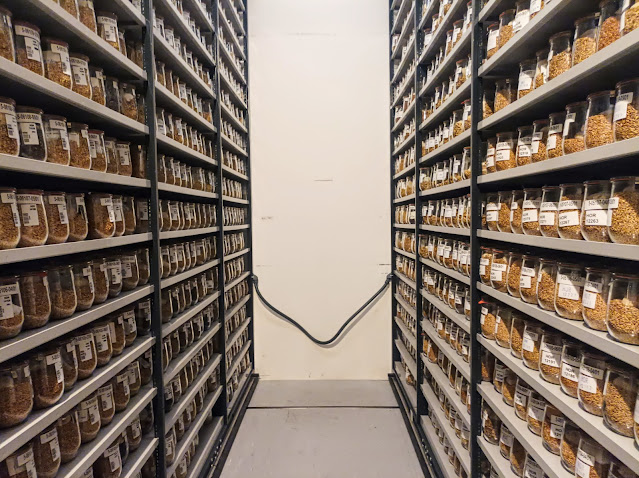The Green Ark of Gatersleben
Today I had the privilege of attending a small tour of the IPK Gatersleben Seed Bank (Genbank), also known as the “Vavilov Building”. The IPK Genbank houses a vast collection of seeds, including over 150,000 samples from different plant species. These samples represent a wide genetic diversity, ranging from ancient and traditional varieties to wild and rare species. The seed bank strives to preserve this genetic diversity to ensure its availability for scientific research, crop improvement, and food security in the future.
Current crops have been so domesticated that unintentionally, we have enhanced their attributes related to yield, production, and quality of edible parts or grains. The energy that their wild ancestors invested in defending themselves and strengthening certain non-edible parts has been redirected towards vegetative growth or grain filling. We have taken care of environmental stresses and pathogens through agricultural practices and treatments that "pamper" our crops. However, it is essential not only to safeguard the seeds of current and past plants but also to keep them alive. Many seeds can remain viable for decades, but others may have a viability of only five years. Germinating them and observing the attributes of those plants and unique genetic characteristics is crucial to ensure food security because genetic diversity allows crops to adapt to new diseases, climate changes, and other challenges. In addition to cultivated plants, seed banks may also include seeds of endangered plant species. These collections help safeguard biological diversity and contribute to conservation efforts.
Today's tour reminded me of the story of Nikolai Vavilov, the botanist to whom the IPK seed bank owes its nickname. In essence, what seed banks do on a larger scale is a replication of what Vavilov did in the last century. He conducted extensive botanical expeditions to different parts of the world, collecting a wide variety of seeds and plant samples. His main goal was to understand the genetic diversity of agricultural crops and their wild relatives. He was a pioneer in the concept of “centers of origin” of crops, identifying specific geographical regions where various cultivated species originated and diversified. His work laid the foundation for understanding genetic diversity and its importance for food security and sustainable agriculture.
I do not convince you? Imagine plants that exist in the wild and are adapted to highly saline soil. When a seed company wants to introduce that capability, they have to obtain those genes from wild varieties because that's where they manifest.
Vavilov intended to use this genetic diversity to create hybrid crops that could grow anywhere in the Soviet Union. His seeds would be the basis for the expansion of the empire. However, during Stalin's regime in the Soviet Union, Vavilov's ideas were questioned and discredited due to his defense of Mendelian genetics against the Lysenkoist biology theories, which had a more ideological approach. Vavilov was arrested in 1940 and sentenced to prison, where he died in 1943.
The Nazis, on the other hand, appreciated Vavilov's work and recognized the strategic value of plant genetic resources that would feed the inhabitants of Hitler's Reich, which aimed to encompass the world. In the winter of 1941-42, they attempted to gain access to his seed collections in Leningrad and exploit the scientific knowledge and genetic diversity for their own purposes. But the tons of stored grain in the center's buildings survived the Nazis thanks to the efforts of the scientists and institute personnel who risked their lives to hide and protect the seeds during the war. Two scientists, A.G. Stchukin and D.S. Ivanov, died of starvation surrounded by thousands of seed packages. And they were not the only ones. Outside, the Russians were dying of hunger. Therein lies the dilemma... as that sacrifice allowed these valuable collections to remain intact and be safeguarded for future generations.






Comentarios
Publicar un comentario